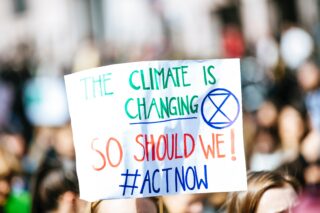The most populated areas of the United States, as well as those regions in which a high level of industrial development was observed in the 60-70s, stood at that time on the verge of a large-scale environmental crisis.Due to the use of open-pit mining of some minerals, the area of “badlands” began to increase significantly (the literal translation is “bad land”, this is land with a very difficult, hilly, ridged and absolutely unsuitable for development relief), due to the total motorization of the country large cities began to turn into “smogopolises”, and the organic life of the great American lakes began to fade away little by little.All of the above factors forced the leadership of the United States to approve a special law that began to protect the environment at the federal and national levels.
In the United States, a complex branch of environmental law began to take shape, which was focused on the implementation of a model of safe (environmentally) development.The basis of environmental law is the norms of common law, however, there is also legislation aimed at regulating the relationship of environmental rights.In addition to federal legislation, there are also special laws of individual states.
Legal regulation of environmental protection
The legislation of the country concerning ecology has such directions as:
- Preservation and protection of especially valuable natural objects;
- Rational use of natural resources;
- Prevention of pollution of natural objects.
The main one is the law on national policy related to environmental protection.
It was adopted back in 1969 and is designed to control such things as:
1. Responsibility for environmental protection should rest with federal agencies;
2. Scheme for the implementation of these duties
There is a special council under the President, which is responsible for the quality of the environment.It functions as an advisory and subsidiary body.In addition, the president of the country is entrusted with the duty to conduct annual reports on the state of the environment and changes in it.Also, US law provides for the regulation of relations for the protection of the environment, as well as its change.Legal regulation in this area is not limited to an integrated approach.US legislation regulates relations for the protection of the environment from various pollution as well as for individual objects.This refers to the protection of waters, flora and fauna, the marine environment, neutralization and disposal of toxic substances and solid waste, etc.

Environmental problems to achieve certain goals in the economy
Back in 1992, Rio de Janeiro adopted a special declaration regarding the environment and its development.It says that all countries need to cooperate to create an open international economic system, as this will contribute to the sustainable development of these countries.Any technologies that are aimed at solving resource-saving and environmental problems should be accessible to everyone.However, the declaration approved at the conference in Rio-92, such states as Greece, Britain, France and the United States have not fulfilled.According to Academician N. N. Moiseev, such rules of behavior in the economy are recommended for the world, which have already been tested in different countries.However, it is not possible to engage in the introduction of modern management methods in those countries that are developing.
The main environmental issue is the fight against carbon dioxide emissions and energy consumption.America consumes much more energy per capita than does the developing world, and its carbon dioxide emissions equal 25% of the total emissions on our planet.Southern countries believe that those states that are most to blame for the fact that the climate on the planet is changing, that is, those that pollute the air and create a “greenhouse effect”, should bear serious responsibility for this.However, the United States categorically disagrees with such rhetoric.Congress refuses to sign any agreement or treaty that limits US energy development.The head of one of the international movements for the protection of nature “Friends of the Earth” – T. Jeniper said,that the United States, at any cost, wants to maintain its superiority in the economic sphere, as well as to preserve the traditional way of life for Americans, regardless of the interests of the world community.Commitments that relate to the environment were very clearly demonstrated in Denver, where the G8 meeting was held, and then at a specially convened UN session, which was traditionally held in New York City.The controversy that erupted during this meeting ended with the meeting ending one day late, resulting in only a vague resolution to cut carbon emissions significantly.However, Washington not only did not want to move forward, as the Rio-92 agreements envisage, but even began to abandon these agreements altogether.and also to preserve the traditional way of life for Americans, regardless of the interests of the world community.Commitments that relate to the environment were very clearly demonstrated in Denver, where the G8 meeting was held, and then at a specially convened UN session, which was traditionally held in New York City.The controversy that erupted during this meeting ended with the meeting ending one day late, resulting in only a vague resolution to cut carbon emissions significantly.
However, Washington not only did not want to move forward, as the Rio-92 agreements envisage, but even began to abandon these agreements altogether.and also to preserve the traditional way of life for Americans, regardless of the interests of the world community.Commitments that relate to the environment were very clearly demonstrated in Denver, where the G8 meeting was held, and then at a specially convened UN session, which was traditionally held in New York City.The controversy that erupted during this meeting ended with the meeting ending one day late, resulting in only a vague resolution to cut carbon emissions significantly.However, Washington not only did not want to move forward, as the Rio-92 agreements envisage, but even began to abandon these agreements altogether.which relate to the environment were very clearly demonstrated in Denver, where the G8 meeting was held, and then at a specially convened UN session, which was traditionally held in New York City.
The controversy that erupted during this meeting ended with the meeting ending one day late, resulting in only a vague resolution to cut carbon emissions significantly.However, Washington not only did not want to move forward, as the Rio-92 agreements envisage, but even began to abandon these agreements altogether.which relate to the environment were very clearly demonstrated in Denver, where the G8 meeting was held, and then at a specially convened UN session, which was traditionally held in New York City.


